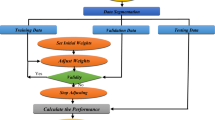Abstract
In this paper we present a particular implementation of the Learn++ algorithm: we investigate the predictability of financial movement direction with Learn++ by forecasting the daily movement direction of the Dow Jones. The Learn++ algorithm is derived from the Adaboost algorithm, which is denominated by sub-sampling. The goal of concept learning, according to the probably approximately correct weak model, is to generate a description of another function, called the hypothesis, which is close to the concept, by using a set of examples. The hypothesis which is derived from weak learning is boosted to provide a better composite hypothesis in generalizing the establishment of the final classification boundary. The framework is implemented using multi-layer Perceptron (MLP) as a weak Learner. First, a weak learning algorithm, which tries to learn a class concept with a single input Perceptron, is established. The Learn++ algorithm is then applied to improve the weak MLP learning capacity and introduces the concept of online incremental learning. The proposed framework is able to adapt as new data are introduced and is able to classify.
Preview
Unable to display preview. Download preview PDF.
Similar content being viewed by others
References
Carpenter, G., Grossberg, S., Marhuzon, N., Reynolds, J., Rosen, D.: Artmap: A neural network architecture for incremental learning supervised learning of analog multidi-mensional maps. Transactions in Neural Networks 3, 678–713 (1992)
McNelis, P.D. (ed.): Neural Networks in Finance: Gaining the predictive edge in the market. Elsevier Academic Press, Oxford (2005)
Freund, Y., Schapire, R.: A decision-theoretic generalization of on-line learning and an application to boosting. Journal of Computer and System Science (1997)
Bishop, C. (ed.): Neural Networks for Pattern Recognition. Oxford University Press, Oxford-London (1995)
Vilakazi, B., Marwala, T., Mautla, R., Moloto, E.: Online bushing condition monitoring using computational intelligence. WSEAS Transactions on Power Systems 1, 280–287 (2006)
Littlestone, N., Warmuth, M.: Weighted majority voting algorithm. Information and computer science 108, 212–216 (1994)
Polikar, R., Byorick, J., Krause, S., Marino, A., Moreton, M.: Learn++: A classifier independent incremental learning algorithm. In: Proceedings of International Joint Conference on Neural Networks (2002)
Polikar, R.: Algorithms for enhancing pattern separability, feature selection and incremental learning with applications to gas sensing electronic noise systems. PhD thesis, Iowa State University, Ames (2000)
Freund, Y., Schapire, R.: A short introduction to boosting. Japanese Society for Artificial Intelligence 14, 771–780 (1999)
Polikar, R., Udpa, L., Udpa, S., Honavar, V.: An incremental learning algorithm with confi-dence estimation for automated identification of nde signals. Transactions on Ul-trasonic Ferroelectrics, and Frequency control 51, 990–1001 (2004)
Grossberg, S.: Nonlinear neural networks: principles, mechanisms and architectures. Neural Networks 1, 17–61 (1988)
Byorick, J., Polikar, R.: Confidence estimation using the incremental learning algorithm. In: Kaynak, O., Alpaydın, E., Oja, E., Xu, L. (eds.) ICANN 2003 and ICONIP 2003. LNCS, vol. 2714, pp. 181–188. Springer, Heidelberg (2003)
McIver, D., Friedl, M.: Estimating pixel-scale land cover classification confidence using nonparametric machine learning methods. Transactions on Geoscience and Remote Sensing 39 (2001)
Leung, M., Daouk, H., Chen, A.: Forecasting stock indices: a comparison of classification and level estimation models. International Journal of Forecasting, 173–190
Author information
Authors and Affiliations
Editor information
Editors and Affiliations
Rights and permissions
Copyright information
© 2006 Springer-Verlag Berlin Heidelberg
About this paper
Cite this paper
Lunga, D., Marwala, T. (2006). Online Forecasting of Stock Market Movement Direction Using the Improved Incremental Algorithm. In: King, I., Wang, J., Chan, LW., Wang, D. (eds) Neural Information Processing. ICONIP 2006. Lecture Notes in Computer Science, vol 4234. Springer, Berlin, Heidelberg. https://doi.org/10.1007/11893295_49
Download citation
DOI: https://doi.org/10.1007/11893295_49
Publisher Name: Springer, Berlin, Heidelberg
Print ISBN: 978-3-540-46484-6
Online ISBN: 978-3-540-46485-3
eBook Packages: Computer ScienceComputer Science (R0)




